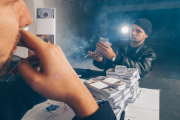Through the shallow whitewater of the Allegheny River, Dad used a sturdy rope to tow The Pie Plate against the current so we could get to a mythical pool where there were reportedly lots of fish hungry for the particular bait we’d brought. Joyce and I were outfitted with those damn bulky orange things again (even though we could both swim by now), and tennis shoes to avoid the fish-hooks we knew were there because we always snagged so many lines ourselves. We would slip and slide on the slimy river rocks while holding onto the side of the boat pretending to help Dad, when in fact we were contributing to Mom’s (by now predictable) hysteria over the whole idea that her precious babies might get dragged down river, trapped under a rock, and drown. Joe, Joe! Get the girls in the boat! The water’s too fast/deep/cold/wet! How we loved him for letting us be! It’s the same spirit that frees a robust young man to marry a woman he discovered during the blind date couldn’t walk. Would you like to dance? I can’t, she replied. Neither can I, he said gamely. No, I mean I really can’t. And she hiked up her skirt to reveal the braces.
My sister and I passed our youth in the same era my mother was called a cripple by college administrators, who rejected her after she’d obtained a full scholarship on merit. You can’t meet the physical education requirement, they said, watching her lurch on crutches. I can swim she said, and she did, as graceful and strong with her powerful upper body as any fish. At the end of her first year they said, You can’t major in journalism because you can’t follow a story. To get to class, her father had driven nails through the rubber-tipped ends of her crutches so she could navigate the city bus and Pittsburgh sidewalks in ice and snow. But she was unable to sway the dean. So she switched to education—and was told the following year that she would not be allowed to continue because, You can’t command respect in a classroom. The dean directed her to business school; she directed him to Hades. After that she educated herself and anyone else who would listen, which eventually included my father, a rebel who never finished high school. Together they were formidable, unfettered by fear of failure.
***
On the last leg of our trip, the Thompson River, glorious, glacial, topaz, runs headlong into the mighty, muddy Fraser, the largest river in British Columbia and a product of the soil-rich runoff of hundreds of miles of fertile land. The steward announces we will be able to see the waters of these two rivers visibly blend.
Some passengers dash for the outside platforms. I step around a beverage cart and stand next to a large window at the front of the car. At first all I can see is the teal of the Thompson we’ve been alongside for hours, sparkling on the right. Then we round a bend and the mocha Frasier appears, nearly twice as wide. At a broad peninsula of scrub the Fraser barrels in from the left, swirling its silted brown into the Thompson blue-green in vibrant curving whirlybirds, a starkly demarcated but wildly dynamic frontier—writhing ribbons, all turquoise and coffee and creamy froth. After a few more bends of the new waterway, no trace can be seen of the singular entities that formed it. Two rivers, intimately bound, forever changed.
***




